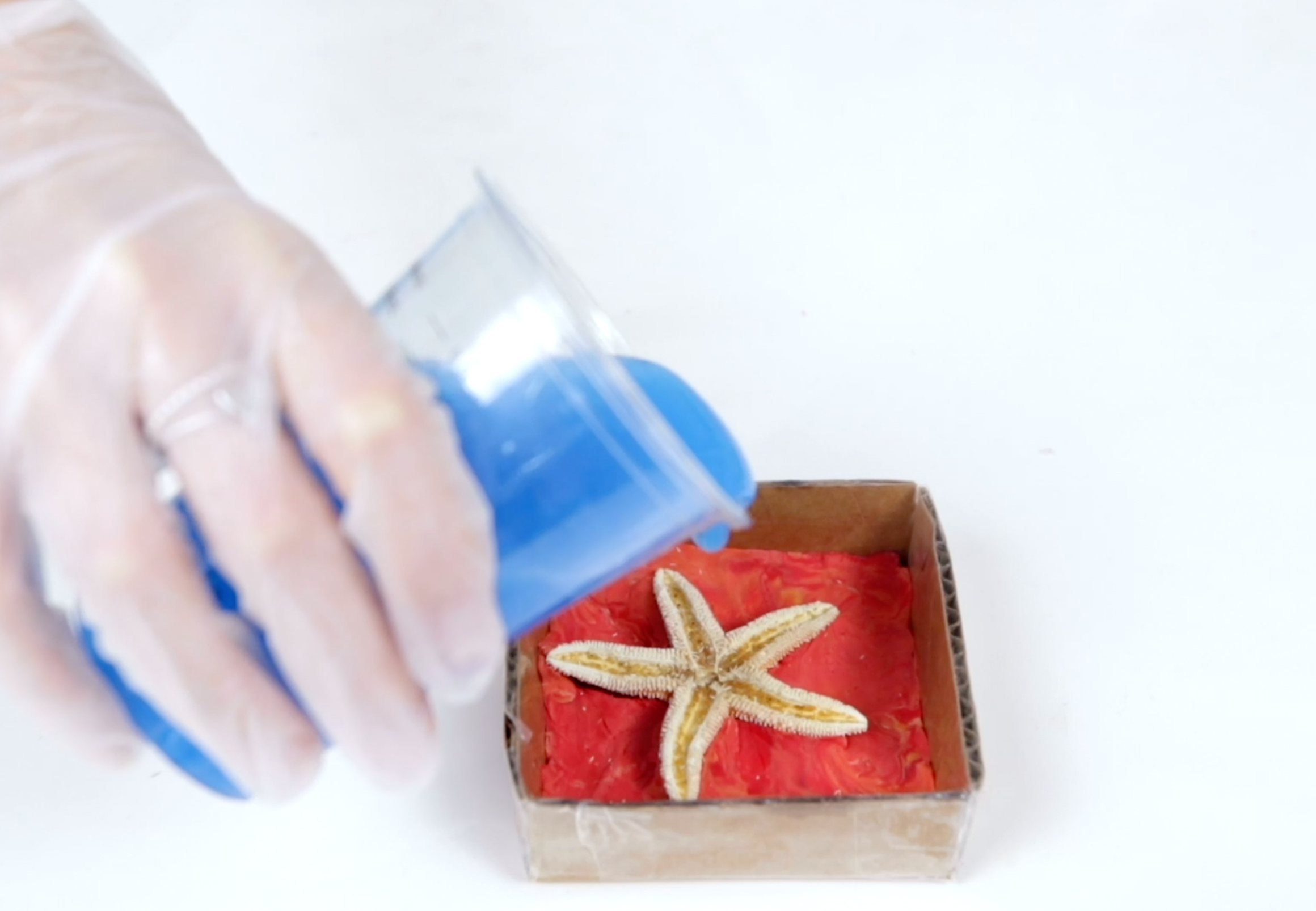Remember the 80s? The hair, the fashion, the music.
How about recording your favorite songs on a cassette tape and giving it to your high school crush? Mixed tapes were everything.
Revisit those memories with Mold Making Material, a 2-part silicone product for making your own reusable resin molds. Use it to make cassette tape replicas with a colorful spin for your own mixed tape artwork!
Copy that.
What You'll Need:
- A cassette tape
- A box slightly bigger than the cassette tape
- Plasticine or Play-Doh
- Glue
- Mold Making Material
- ArtResin epoxy resin
- Disposable gloves
- Stir Sticks
- Mixing cup with easy to read measurement lines
- ResinTint
- Plastic mixing cup, one for each color you wish to mix
One Part Vs Two Part Molds
The cassette tape has a unique shape with a flat bottom, contoured sides and several holes all over which presented a bit of a dilemma: should we use a one-part mold method or a two-part?
With a one-part mold, the silicone mixture is poured around an object in one sitting. It's the quickest and simplest method, but works best for an object with a flat bottom or sides that can stand upright on its own.

On the other hand, a two-part mold is better suited to an object that isn't flat and requires assistance to stand in the mold box. A two-part mold is made in two separate pours, using plasticine in the bottom half of the mold box to hold the object in place.

Although the cassette tape has an irregular shape, it can stand on its own and can work with both a one- or a two-part mold. In the end, we decided to go for a straightforward one-part mold. You can read more about each method in our blog Mold Making Material: One-Part vs. Two-Part Molds.
1. Prepare The Box
Find a box just slightly bigger than the cassette tape. The box should provide a snug fit while still leaving about 1/2" of space on each side to create a strong, durable mold that can be used again and again. You can use plastic or plastic lined items such as yogurt cups or milk containers cut to size. We used an acrylic cube that allowed us to place the cassette tape on an angle. 
You can make your own box to surround your object from cardboard, wood or foam core sealed with plastic tape to make it leakproof. Learn more about custom boxes in our blog How To Build A Box For Mold Making.

2. Prepare The Cassette Tape:
First, remove all the magnetic tape from inside the cassette. Next, fill any holes or gaps with play-doh or plasticine to ensure easy removal from the mold. Don't worry about the two signature holes on the face of the cassette - they can be restored later.

Next, glue the cassette to the bottom of the box so that it won't move once the liquid silicone mixture is poured over top.
3. Prepare The Mold Making Material:
Mold Making Material is a 2 part silicone product that makes durable, flexible molds that stretch without tearing and can be used over and over again. It's non-toxic, odorless and safe for home use. There are no VOCs, no BPAs, and no fumes.Measure out equal amounts of Mold Making Material and stir it up. Conveniently, Mold Making Material comes in a Part A and Part B that are 2 different colors: white and dark blue. You'll know when the mixture is ready once the color becomes a consistent medium blue hue.




Next, pour the mixture into the acrylic cube and over the cassette tape.

Mold Making Material solidifies in 3-4 hours at room temperature. You can poke the top of the silicone to make sure that it's not sticky anymore before removing it from the box.

Once the silicone has fully cured, the mold needs to be removed from the box. If you aren't able to to dig your fingers down the side, you can break the frame to release the mold.


Once the mold is released, the cassette tape needs to be removed. Using a blade, carefully cut the mold across the top of the cassette and gently pry it out.

Congratulations - your mold is complete and you're ready to make replicas!

4. Making A Replica
You can use many different substances to fill the mold, such as cement, plaster, polyurethane, soap, clay, polymer clay, play dough and wax, but we recommend ArtResin epoxy resin in combination with our line of ResinTints.
💡 TIP: You can also use Mold Making Material for food safe molds to create personalized shapes out of chocolate, candy, ice, butter and more! Just remember, molds made for use with food should ONLY be used for food. For more information, see our blog Make Your Own Food Safe Silicone Molds.

Just like Mold Making Material, ArtResin is a simple 1:1 ratio of resin and hardener. Measure out equal parts of both solutions and mix thoroughly for 3 minutes. You’ll have approximately 45 minutes of working time with the resin mixture before it will begin to set.



Now it's time to add that style and pizazz we were talking about earlier.
Add a few drops of any color of ResinTint into the ArtResin and mix together until you have one consistent hue. ResinTint is a highly saturated colorant so always start with less than you think you'll need - you can always add more if necessary.
💡TIP: No matter which colorant you use, don't exceed 6% of the total combined volume of resin and hardener, otherwise your resin may not cure properly. For example, if you have 50 ml resin + 50 ml hardener for a total of 100 ml, don't exceed 6 ml of colorant.


Pour your tinted resin into the mold, right to the top, and let it sit for at least 24 hours. ArtResin is hard to the touch after 24 hours, but a full, hardened cure will take 72 hours.

Once 24 hours has passed, the resin will be hard to the touch and the cassette tape casting can be removed from the mold. Repeat this process many times over - the mold is strong enough to make multiple copies.



Now, about those holes - we used an electric drill slightly smaller than the size of the hole and slowly drilled to restore the holes and complete the look.

We were so happy with the incredible detail we were able to capture that we made a few different versions of our cassette tape replicas and decided to create a full, mixed tape art piece display. It did not disappoint!

We hope this video inspires you to create your own nostalgic art - it really is fun with endless possibilities.
Who knew cloning could be such fun?!
Well, we did. And that’s why there’s Mold Making Material. So go ahead. Make a copy. And then make another, and another, and another, and another…
Check out our blog on How To Make Textured Resin Art.
ArtResin: The Original Epoxy For Resin Art.


